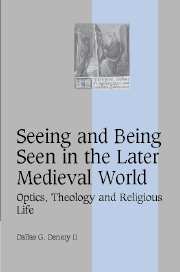Book contents
- Frontmatter
- Contents
- Acknowledgments
- INTRODUCTION: VISION AND VISUAL ANALOGY DURING THE LATER MIDDLE AGES
- 1 PONDERARE STATERA MEDITATIONIS: SELF AS SELF-PRESENTATION IN EARLY DOMINICAN RELIGIOUS LIFE
- 2 THE DEVIL IN HUMAN FORM: CONFESSION, DECEPTION AND SELF-KNOWLEDGE
- 3 PETER OF LIMOGES, PERSPECTIVIST OPTICS AND THE DISPLACEMENT OF VISION
- 4 NORMALIZING ERROR: PETER AUREOL ON THE IMPORTANCE OF APPEARANCES
- 5 PROBABILITY AND PERSPECTIVE: NICHOLAS OF AUTRECOURT AND THE FRAGMENTATION OF VISION
- CONCLUSION: VISION, PROMISE, DEFERRAL
- Bibliography
- Index
- Cambridge Studies in Medieval Life and Thought Fourth series
1 - PONDERARE STATERA MEDITATIONIS: SELF AS SELF-PRESENTATION IN EARLY DOMINICAN RELIGIOUS LIFE
Published online by Cambridge University Press: 18 July 2009
- Frontmatter
- Contents
- Acknowledgments
- INTRODUCTION: VISION AND VISUAL ANALOGY DURING THE LATER MIDDLE AGES
- 1 PONDERARE STATERA MEDITATIONIS: SELF AS SELF-PRESENTATION IN EARLY DOMINICAN RELIGIOUS LIFE
- 2 THE DEVIL IN HUMAN FORM: CONFESSION, DECEPTION AND SELF-KNOWLEDGE
- 3 PETER OF LIMOGES, PERSPECTIVIST OPTICS AND THE DISPLACEMENT OF VISION
- 4 NORMALIZING ERROR: PETER AUREOL ON THE IMPORTANCE OF APPEARANCES
- 5 PROBABILITY AND PERSPECTIVE: NICHOLAS OF AUTRECOURT AND THE FRAGMENTATION OF VISION
- CONCLUSION: VISION, PROMISE, DEFERRAL
- Bibliography
- Index
- Cambridge Studies in Medieval Life and Thought Fourth series
Summary
CONTEMPLATION, SPECULATION, MIRACLE
In the Vitae fratrum, a collection of stories compiled during the 1250s concerning the formation and early growth of the Dominican Order, Gerard de Frachet relates the tale of a certain unnamed English friar. It seems this friar thought it might be a good idea to incorporate “as many philosophical reasonings and axioms as possible into the matter of his sermon.” The night before he was to give his sermon, Christ appeared before him as he slept and handed him a bible covered in filth. When the friar asked for a reason, Christ opened the book and showed him that, despite its cover, the pages themselves were spotless. “My word is fair enough,” Christ tells the Englishman, “but it is you who have defiled it with your philosophy.” The tale itself is not particularly unusual. It is only one in a series of short anecdotes scattered throughout the Vitae fratrum that point up a certain unease with studying, with philosophy and with teaching. Another, for example, concerns a friar whose “whole mind had been given to the pursuit of philosophy.” One night God summoned him to the judgment chair and convicted him of being a philosopher, not a friar, “whereupon he was stripped and beaten without pity. When he awoke he felt the pains in all his limbs as if he had been scourged bodily.”
Of course, Dominicans were not alone in their ambivalence towards studying, nor in their recognition of its importance.
- Type
- Chapter
- Information
- Seeing and Being Seen in the Later Medieval WorldOptics, Theology and Religious Life, pp. 19 - 38Publisher: Cambridge University PressPrint publication year: 2005



